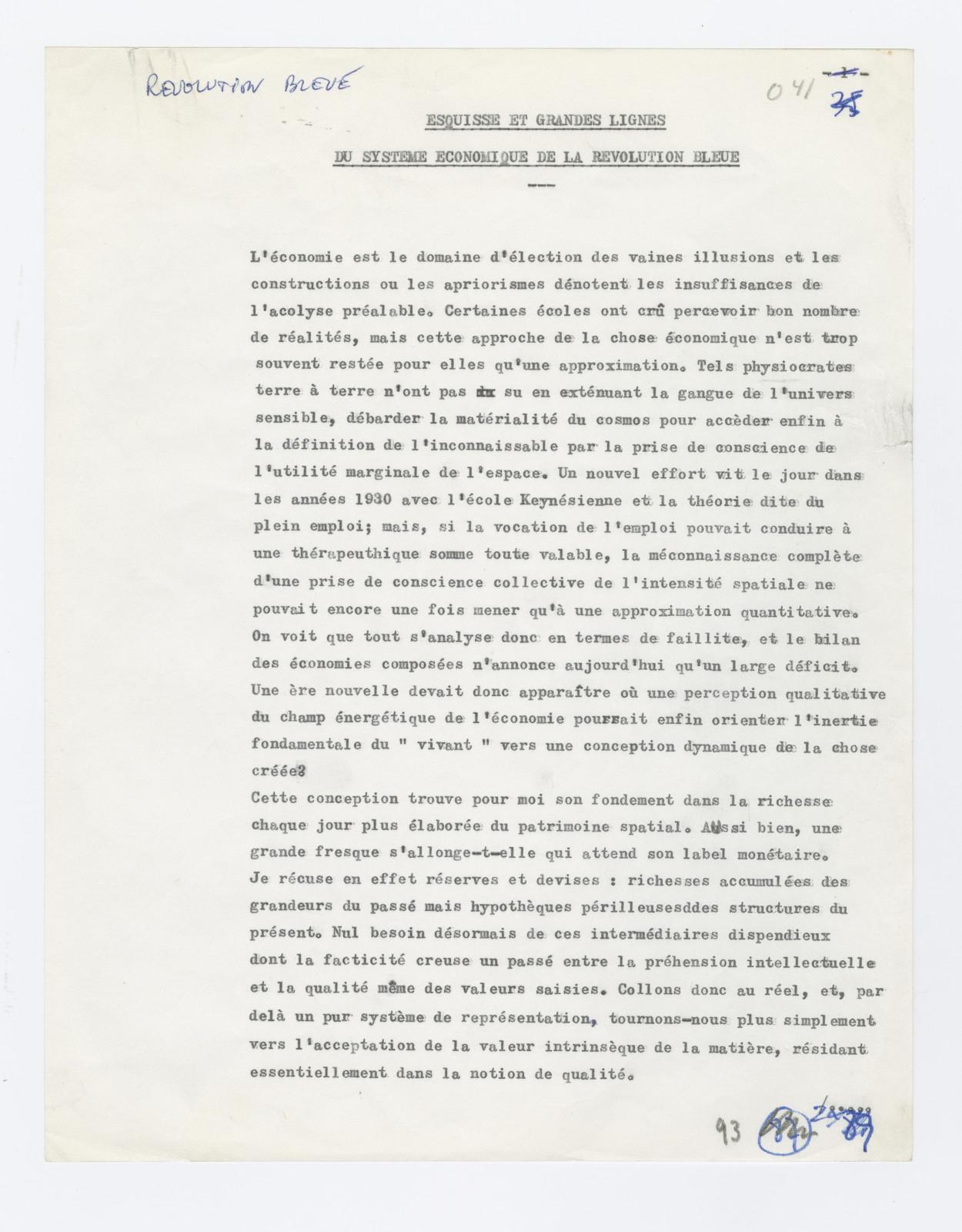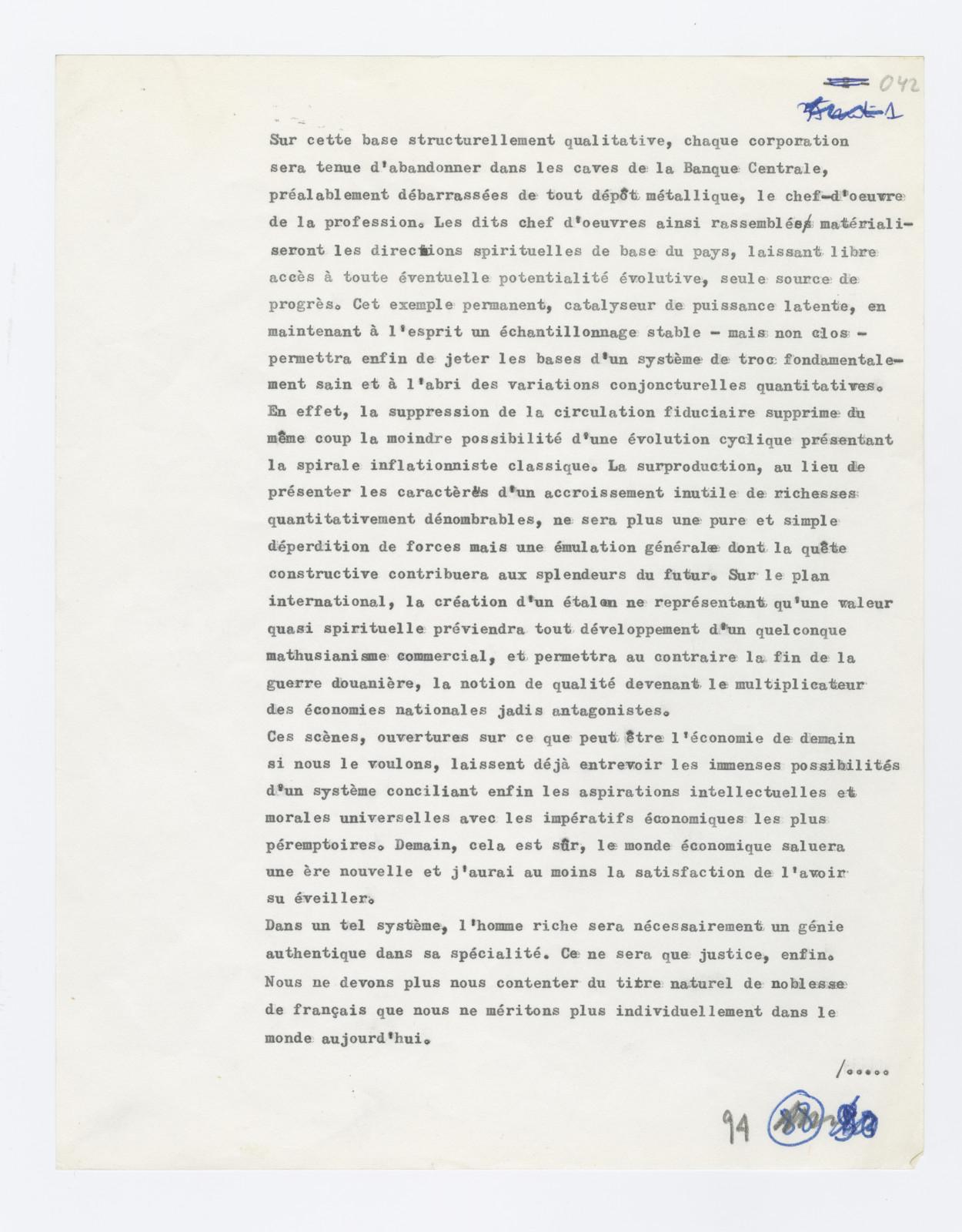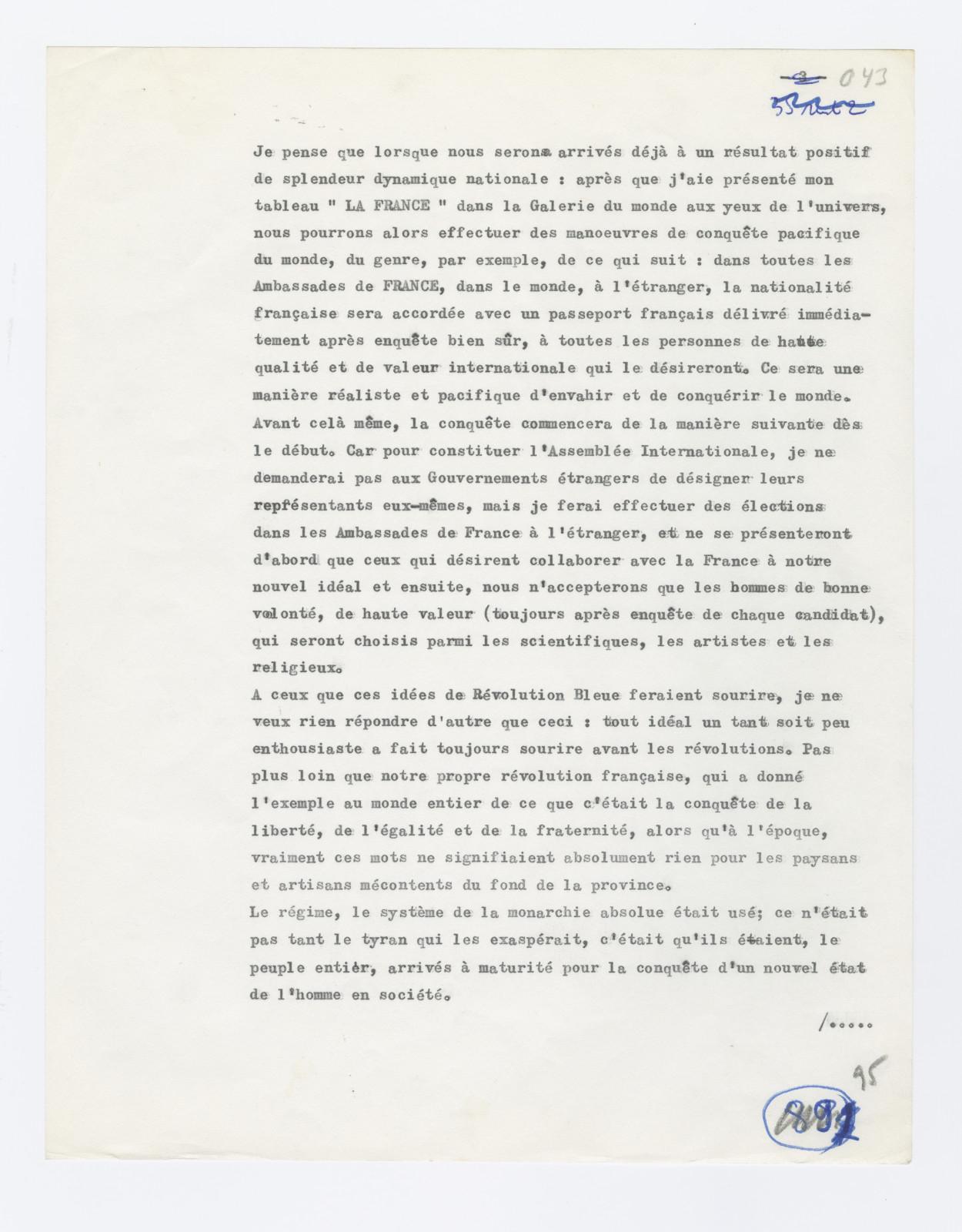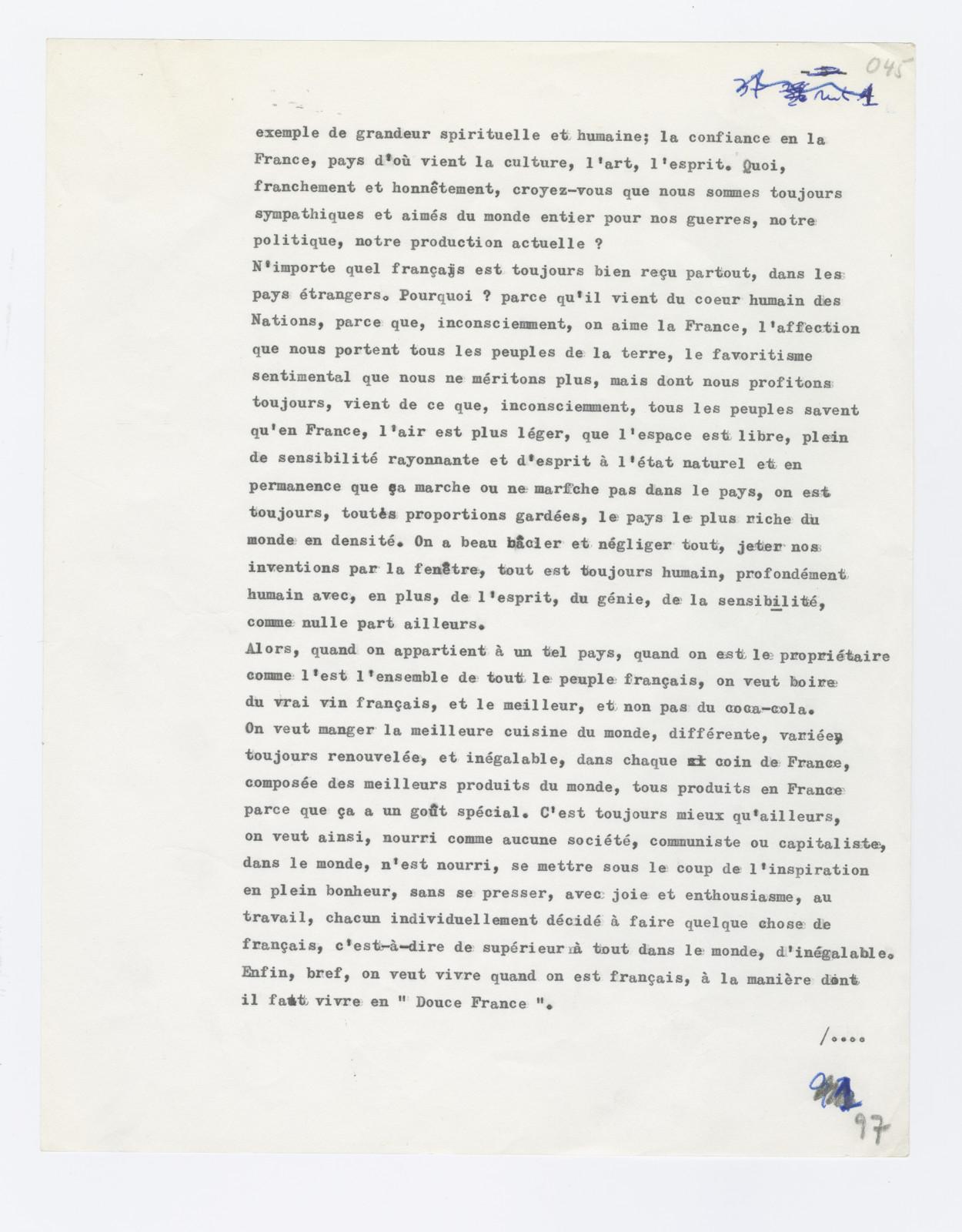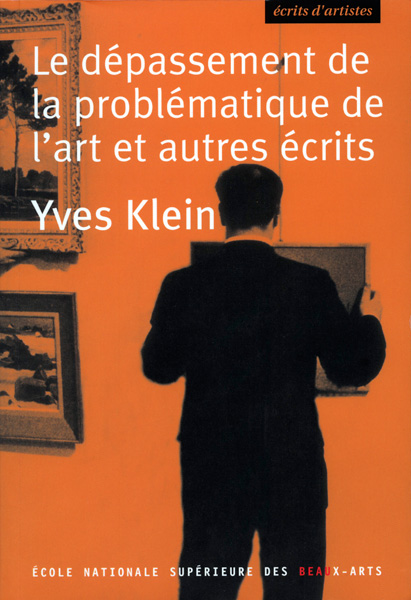Sketch and Broad Outlines for the Economic System of the Blue Revolution
The economy is the elective domain of vain illusions and of constructions in which the suppositions denote the insufficiencies of the prior analysis. Certain schools believed to perceive a good number of realities, but this approach to economic matters has too often remained for them only an approximation. Some down-to-earth physiocrats did not known, while exhausting the gangue of the sensible universe, to break up the materiality of the cosmos in order finally to reach the definition of the unknowable by the sudden awareness of the marginal unity of space. A new effort came to light in the 1930s with the Keynesian school and its Full Employment Policy; but if the vocation of employment was able to lead to a valuable therapeutic amount, the complete failure of the general public to recognize spatial intensity could only lead once more to a quantitative approximation. We see therefore that everything is analyzed in terms of failure, and the balance sheet of composite economies today reveals only a large deficit.
A new era must thus appear in which a qualitative perception of the energetic field of the economy can at last orient the fundamental inertia of the living towards a dynamic conception of creation. For me this concept finds its foundation in the wealth, each day more elaborated, of spatial patrimony. It stretches out like a great fresco that awaits its monetary label. In effect I challenge reserves and currencies: riches glories of the past but perilous mortgages of the structures of the present. No need henceforth for these wasteful intermediaries whose facticity hollows out a past between the intellectual prehension and the very quality of the values seized. Adhere therefore to the real, and, beyond a pure system of representation, let us then turn more simply toward the acceptance of the intrinsic value of matter, residing essentially in the notion of quality.
Upon this structurally qualitative foundation, each corporation will be made to deposit in the vaults of the Central Bank, previously emptied of all deposits of metals, their masterpiece of the profession. Said masterpieces, thus gathered, will materialize the basic spiritual direction of the country, providing free access to any and all evolutionary potentiality – the sole source of progress. This permanent example, a catalyst of latent power, in maintaining in the spirit a stable sampling – but one that remains open – will finally allow to cast the foundations of a system of barter that is fundamentally healthy and sheltered from economic qualitative variations.
Indeed, the suppression of fiduciary circulation eliminates also the slightest possibility of a cyclical evolution of the classic inflationary spiral. Overproduction, instead of presenting useless growth of qualitatively enumerable riches, will no longer be a pure and simple loss of strength but a general emulation whose constructive quest will contribute to the splendors of the future. In the international arena, the creation of a standard representative only of a quasi-spiritual value will prevent the development of any form of commercial Malthusianism, and will end, on the contrary, conflicts over customs duties, the motion of quality becoming a multiplier of past antagonistic national economies.
These brief opening comments on a possible economy of tomorrow, should we desire it, already provide glimpses into the enormous possibilities of a system that, at last, reconciles universal moral and intellectual aspirations with the most peremptory economic imperatives. Tomorrow, to be sure, the economic world will greet a new era and I shall at least have had the satisfaction to have known its awakening.
In such a system, the wealthy man would necessarily be an authentic genius in his specialty. Which, at last, will be only just.
The economy is the elective domain of vain illusions and of constructions in which the suppositions denote the insufficiencies of the prior analysis. Certain schools believed to perceive a good number of realities, but this approach to economic matters has too often remained for them only an approximation. Some down-to-earth physiocrats did not known, while exhausting the gangue of the sensible universe, to break up the materiality of the cosmos in order finally to reach the definition of the unknowable by the sudden awareness of the marginal unity of space. A new effort came to light in the 1930s with the Keynesian school and its Full Employment Policy; but if the vocation of employment was able to lead to a valuable therapeutic amount, the complete failure of the general public to recognize spatial intensity could only lead once more to a quantitative approximation. We see therefore that everything is analyzed in terms of failure, and the balance sheet of composite economies today reveals only a large deficit.
A new era must thus appear in which a qualitative perception of the energetic field of the economy can at last orient the fundamental inertia of the living towards a dynamic conception of creation. For me this concept finds its foundation in the wealth, each day more elaborated, of spatial patrimony. It stretches out like a great fresco that awaits its monetary label. In effect I challenge reserves and currencies: riches glories of the past but perilous mortgages of the structures of the present. No need henceforth for these wasteful intermediaries whose facticity hollows out a past between the intellectual prehension and the very quality of the values seized. Adhere therefore to the real, and, beyond a pure system of representation, let us then turn more simply toward the acceptance of the intrinsic value of matter, residing essentially in the notion of quality.
Upon this structurally qualitative foundation, each corporation will be made to deposit in the vaults of the Central Bank, previously emptied of all deposits of metals, their masterpiece of the profession. Said masterpieces, thus gathered, will materialize the basic spiritual direction of the country, providing free access to any and all evolutionary potentiality – the sole source of progress. This permanent example, a catalyst of latent power, in maintaining in the spirit a stable sampling – but one that remains open – will finally allow to cast the foundations of a system of barter that is fundamentally healthy and sheltered from economic qualitative variations.
Indeed, the suppression of fiduciary circulation eliminates also the slightest possibility of a cyclical evolution of the classic inflationary spiral. Overproduction, instead of presenting useless growth of qualitatively enumerable riches, will no longer be a pure and simple loss of strength but a general emulation whose constructive quest will contribute to the splendors of the future. In the international arena, the creation of a standard representative only of a quasi-spiritual value will prevent the development of any form of commercial Malthusianism, and will end, on the contrary, conflicts over customs duties, the motion of quality becoming a multiplier of past antagonistic national economies.
These brief opening comments on a possible economy of tomorrow, should we desire it, already provide glimpses into the enormous possibilities of a system that, at last, reconciles universal moral and intellectual aspirations with the most peremptory economic imperatives. Tomorrow, to be sure, the economic world will greet a new era and I shall at least have had the satisfaction to have known its awakening.
In such a system, the wealthy man would necessarily be an authentic genius in his specialty. Which, at last, will be only just.
| Technical | Tapuscrit sur papier |
